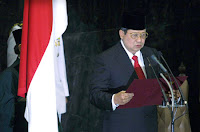Indonesia, which has seen a flood of foreign investment this year, is edging closer to securing an investment-grade ratings status for the first time since the Asian financial crisis in 1997-1998.
Standard & Poor's on Friday revised its outlook on Indonesia's sovereign debt rating to positive from stable, citing expected improvements in the country's debt profile following economic reforms.
A fund manager at PIMCO said in a report that Indonesia could regain its high-grade status in 3-4 years as long as government policies focus on long-term growth.
An high-grade rating would mean increased investment by funds that, according to their mandate, can only buy high-grade rated debt.
For S&P and Fitch, the lowest investment-grade credit rating before junk is BBB-minus. For Moody's it is Baa3.
History of Indonesia's sovereign debt ratings…(see the source)
SEE ALSO:
S&P ups Indonesia rating outlook to positive – Alibaba News/Reuters
Pimco Says Indonesia May Win Investment Grade Rating - Bloomberg
Standard & Poor's on Friday revised its outlook on Indonesia's sovereign debt rating to positive from stable, citing expected improvements in the country's debt profile following economic reforms.
A fund manager at PIMCO said in a report that Indonesia could regain its high-grade status in 3-4 years as long as government policies focus on long-term growth.
An high-grade rating would mean increased investment by funds that, according to their mandate, can only buy high-grade rated debt.
For S&P and Fitch, the lowest investment-grade credit rating before junk is BBB-minus. For Moody's it is Baa3.
History of Indonesia's sovereign debt ratings…(see the source)
SEE ALSO:
S&P ups Indonesia rating outlook to positive – Alibaba News/Reuters
Pimco Says Indonesia May Win Investment Grade Rating - Bloomberg





























